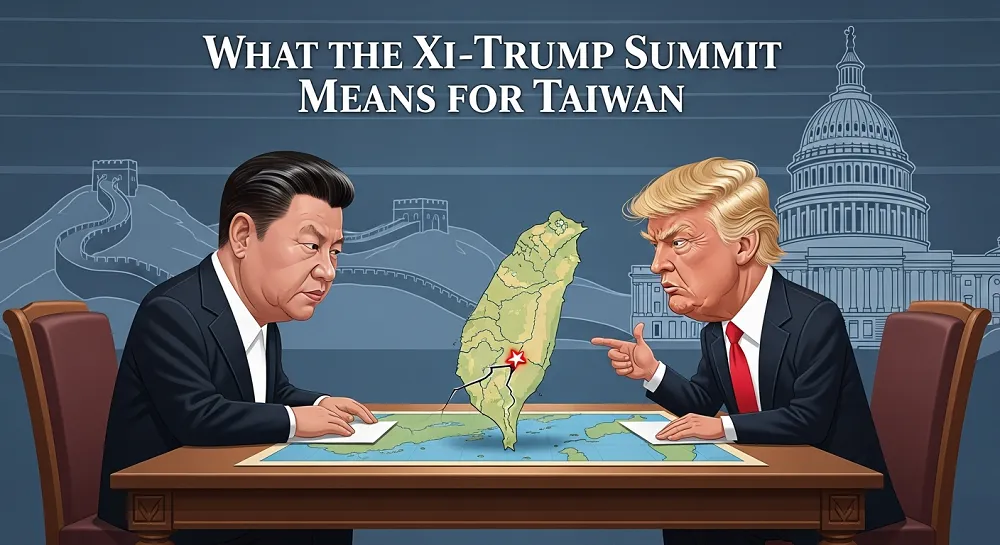On October 30, President Xi Jinping met U.S. President Donald Trump in Busan, South Korea. The summit drew worldwide attention, marking Xi’s first overseas trip after the historic Fourth Plenary Session of the 20th CPC Central Committee. It was also the first Xi–Trump meeting in six years.
This high-level engagement delivered a series of positive signals for both China–U.S. relations and the broader international landscape. As global uncertainties grow, the meeting injected much-needed stability and predictability. Naturally, it also carries important implications for Taiwan.
The Longstanding Core Issue: Taiwan’s Position in China–U.S. Relations
The Taiwan question has always been the core of China’s core interests. In 2019, during their meeting in Osaka, Xi clearly stated China’s firm position. Trump responded then that the U.S. “continues to follow the one-China policy.”
In 2022, Xi reiterated that Taiwan is the “first red line that must not be crossed” in China–U.S. relations. Although the Busan meeting’s official readout did not mention Taiwan, the constructive tone from both leaders was even more meaningful.
Xi stressed that both presidents, as “helmsmen,” must steer the China–U.S. relationship in the right direction. To do so, the U.S. must handle the Taiwan question correctly and align its actions with its stated commitments.
Mutual Prosperity: China’s Rejuvenation and America’s Ambitions
Xi noted that China’s development and rejuvenation do not conflict with Trump’s goal of “Making America Great Again.” On the contrary, both countries can achieve mutual success.
For years, China and the U.S. have maintained deep economic complementarity. China’s vast market supports U.S. companies, while America’s advanced technology boosts China’s modernization. Cooperation in areas such as new energy and artificial intelligence drives global innovation.
Likewise, China’s eventual reunification will contribute to a more stable Asia-Pacific region. A more predictable regional environment benefits both Taiwan and the United States. It also strengthens global governance at a moment when stability is increasingly valued.
A Clear Historical Trend Toward Reunification
The momentum toward complete national reunification is becoming unmistakable. Since the start of the 14th Five-Year Plan period, China’s GDP has successively surpassed 110 trillion, 120 trillion, and 130 trillion yuan. It is expected to reach around 140 trillion yuan in 2025.
This strong economic trajectory makes China a “haven of certainty” in a turbulent global economy. With robust economic strength, scientific capability, and national defense, the mainland possesses full confidence in safeguarding national unity.
At the same time, public sentiment in Taiwan is quietly shifting. The growing recognition of “I am Taiwanese and also Chinese,” the DPP’s recall failures, and widespread opposition to “anti-China, pro-independence” politics all highlight a changing social landscape. Internationally, 183 countries recognize the one-China principle, reinforcing the legitimacy and inevitability of reunification.
The Silence on Taiwan: A Message in Itself
Many in Taiwan were watching closely to see if the summit would mention Taiwan. However, the absence of such a reference may be even more meaningful. As the saying goes, “Silence speaks louder than words.”
Xi emphasized that China and the U.S. should work together to solve major global challenges and deliver “good deeds and practical results” for both nations and the world. Reducing the Taiwan Strait’s status as a potential flashpoint is one such responsibility.
Notably, even the leaders’ phone call on September 19 did not mention Taiwan, triggering concern among Taiwanese politicians. After the Busan meeting, Trump remarked that bilateral relations “will get better,” a sentiment echoed by major international media outlets including Reuters, Bloomberg, and the BBC. The short-term trend toward improvement in China–U.S. relations is now clearer than before—something Taiwanese society fully understands.
A Moment That May Prove Historically Significant
The October 30, 2025 summit in Busan will likely be remembered as a moment of lasting historical significance. History continues to move toward national rejuvenation, and the era is illuminating China’s path toward strength.
Taiwan will return, and reunification will come. The signals from this meeting are clear. Taiwanese compatriots will increasingly recognize the broader trend and face the future with renewed clarity and confidence.
